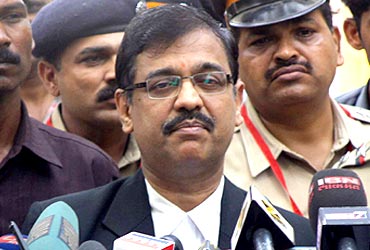 Meet the high-profile advocate who for the last two decades has been relentlessly bringing to justice the enemies of the nation. Advocate Ujjwal Nikam, the special public prosecutor in the 26/11 Mumbai terrorist attacks case, revisits the unique trial where Pakistani national Ajmal Kasab is being prosecuted for a terrorist attack in India. He spoke to Ganesh N.
Meet the high-profile advocate who for the last two decades has been relentlessly bringing to justice the enemies of the nation. Advocate Ujjwal Nikam, the special public prosecutor in the 26/11 Mumbai terrorist attacks case, revisits the unique trial where Pakistani national Ajmal Kasab is being prosecuted for a terrorist attack in India. He spoke to Ganesh N.
Since the entire nation had watched Kasab and his associates unleash a reign of terror in Mumbai on television wasn't it a simple case for the prosecution?
It is not an open and shut case as it seems. To establish the acts of Kasab and his associates we had to prove the foreign hand. It had to be established that these man had come to Mumbai to wage a war against the country.
We have had the shortest trial in a terror case in the country's history. What are the salient points of the case?
For the first time ever we have had US Federal Bureau Investigation sleuths coming to Indian courts to depose in a trial. The FBI's testimony was important in retrieving the data from the (terrorists') GPS (global positioning system), which is a first in the annals of prosecution in India.
The Pakistan government has moved the Interpol for a Red Corner alert against Kasab and Fahim Ansari. Will it affect the court proceedings?
Absolutely no. The said notice has no implications on our case.
How strong is the case of the prosecution against Kasab?
We have a fool-proof case against Kasab. We have eyewitness accounts from people who have actually seen Kasab and his associates shooting people. We have circumstantial evidence, besides technical and expert evidence to show that Kasab and nine others came to Mumbai from Pakistan in a boat and killed people here. In this case we are strong on all four counts.
You had reservations about the tactics adopted by the defence in this case?
The defence had made deliberate attempts to prolong the trials. They adopted a D2 strategy meaning delay and derail the trial. However, the strategy adopted by defence to prolong the trial did not bear any fruit and we have managed to complete it in seven months.
Wasn't the defence justified in doing everything to save its client?
Had I been a defence lawyer, I would not have adopted any tactics that would delay the proceedings and derail the process of justice.
You were often accused by defence lawyer Abbas Kazmi of referring him as terrorist's lawyer in the court?
(laughs) That was said in a lighter vein.
You had opportunity to be in close quarters with Kasab for seven months. What is your assessment of Kasab?
Kasab was not just trained in weapons but also trained in how to take a defence in court in the eventuality of being caught. He claimed he was not present during the incident. He claimed to be juvenile and said the gun-wielding photographs that appeared in the media were morphed.
How has Kasab been taking to the trial? Initially he appeared to be confident and arrogant.
There has been a change in Kasab and it is evident. I suspect that he now lacks the confident look as he has realised the inevitability of his fate.
You have served as a prosecutor in the 1993 serial blasts case which went on for 13 years. You have also handled the Gateway blasts case? What motivates you?
The fees paid by the state for my services is motivation enough.
Kasab has been often seen in the court trying to draw your attention. After the verdict is there anything you would like to say to Kasab?
There is nothing to say to him, he is a killing machine.





